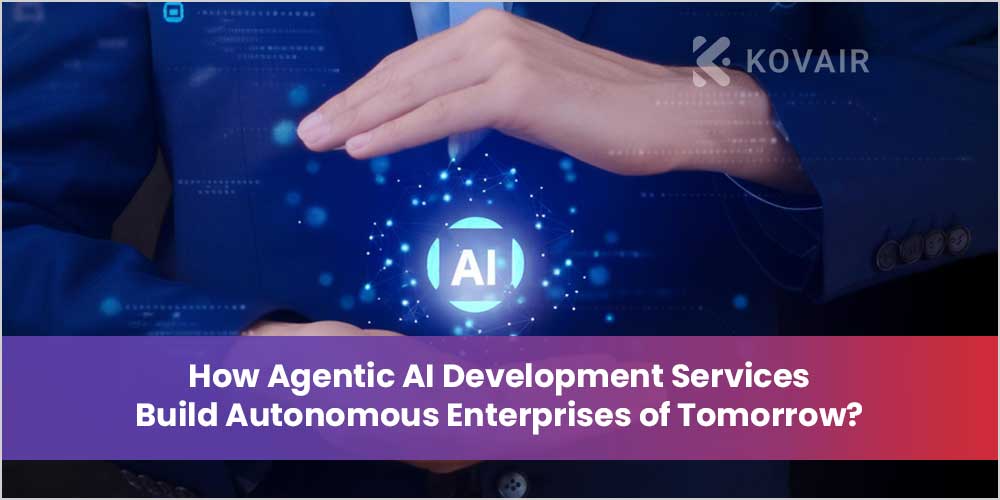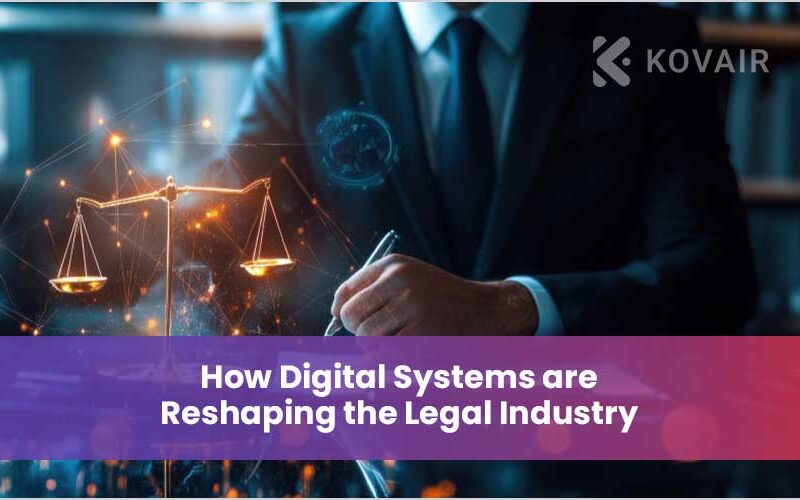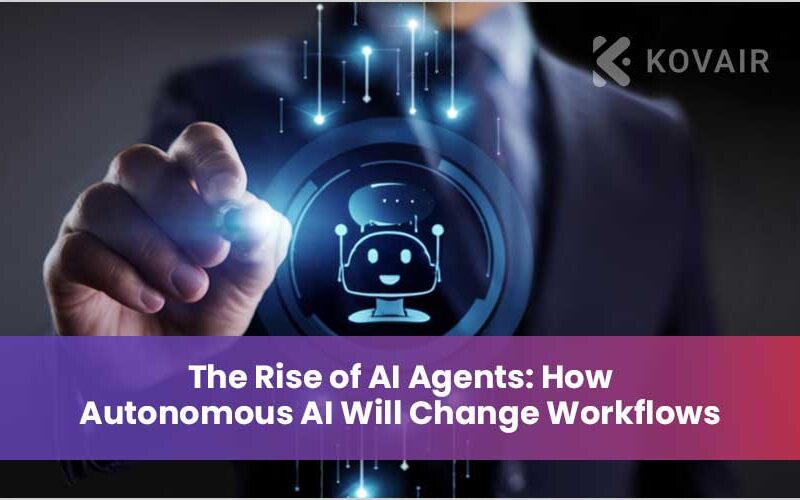
Introduction
Businesses are at a steep turning point in which automation is no longer sufficient, but autonomy is the new competitive frontier. The digital transformation efforts, which were initially focused on process efficiency, are now being redefined in terms of Agentic AI development. The key focus is on the development of smart, goal-oriented, and reasoning systems that can collaborate and self-optimize.
With the passage of 2025 and beyond, organizations are using the Agentic AI services to create what some people may best refer to as living enterprises, dynamic, self-learning ecosystems, change-adaptive, predictive, and operating with little to no human intervention. Enterprises have moved beyond basic automation to intelligence, where AI agents execute complex workflows, learn from context, and make autonomous decisions.
From Automation to Autonomy: The New Enterprise Paradigm
Traditional automation systems were developed in a way that they performed predetermined activities. They were based on fixed work processes and response programming. In contrast, Agentic AI is a paradigm shift from procedural logic towards intent-driven orchestration.
At its core, the Agentic AI development combines several levels of intelligence:
- Perception – interpreting enterprise data, user intent, and environmental indications.
- Reasoning – making sound business decisions.
- Action – running operations independently, both in enterprise applications and workflows.
This transformation is reshaping the enterprise operating models. Companies are no longer building workflows that center on human points of decision; they are building networks of self-driving agents with the capability to reason, act, and learn.
Combined, these capabilities enable agentic AI solutions to act like humans to think, rather than execute processes. To know more about the Agentic AI advantage, check the KPMG report for a better understanding.
How Agentic AI Development Services Enable Enterprise Autonomy
Leading Agentic AI companies are redefining enterprise transformation through the integration of Agentic intelligence in the basic business processes. Here’s how agentic AI development services are architecting autonomy:
1. Multi-agent Ecosystems Design – The development teams create interoperable agents, such as a procurement agent, which then communicate with a finance agent and a compliance agent to make policy-based buying decisions without human intervention.
2. Implementing Enterprise AI Infrastructure – With the help of the LLM orchestration, API-based interoperability, and the unified data layer, the enterprises will be able to make sure that AI agents can work in harmony with CRM, ERP, and analytics platforms.
3. Enabling Workflow Automation Cognitively – Agents are systems that integrate reasoning models, NLP pipelines, and machine learning systems to move past automation scripts and shift to adaptive workflows that continuously self-correct and optimize.
4. Integrating Ethical and Trustworthy AI Governance – With a systematic evolution of agentic systems, AI governance models guarantee adherence, accountability, and regulated evolution in the context of enterprises.
The Architecture Behind Agentic AI Development
The development of autonomous systems needs a well-managed and layered architecture. A capable Agentic AI development framework will typically consist of:
- Data Layer: Give access to both structured and non-structured enterprise data.
- Cognitive Layer: Adding large language models, multimodal transformers, and reasoning engines.
- Decision Layer: Multi-agent coordination of planning and execution of enterprise goals.
- Action Layer: Interaction with automation, APIs, business systems (ERP, CRM, DevOps).
- Governance Layer: Compliance, explainability, people interactions, and ethical oversight.
It is this layer system that makes autonomous enterprise solutions smart and responsible.
Role of Agentic AI Development Services in Enterprise Growth

Source: EY
Organizations require more than models to move from static automation to enterprise autonomy, that is, engineering capability. This is where Agentic AI services come into place.
1. Agent Modeling and Design – Identifying the architecture of the agents, based on organizational functions, such as Finance Agent, HR Agent, Customer Agent, or IT Ops Agent. These agents are aligned with business KPIs, level of autonomy, and learning boundaries.
2. Enterprise AI Integration – The success in interoperability is seamless. The integration specialists will connect legacy systems, cloud APIs, and AI models together using an encrypted middleware, which will guarantee contextual visibility into every department.
3. Reasoning and Strategy Processes – More sophisticated systems like AutoGPT, ReAct, or specialized reasoning engines can allow Agents to think sequentially, plan, and optimize themselves.
4. Governance and Safety Controls – Developers add ethical limits, access control, and explainability functionality to ensure agents are transparent, auditable, and in line with the enterprise governance policies.
5. Continuous Reinforcement – Feedback loops between data continuously improve decisions with time. It generates self-enhancing systems that can adjust to new business environments.
Real-time collaboration with Agentic AI companies gives access to specialized expertise in cognitive modeling, orchestration structures, and multi-agent coordination.
Real-World Use Cases: The Path to the Autonomous Enterprise
There are already agentic architectures showing transformational potential in the sectors.
1. Agentic AI for Customer Experience – The multi-agent systems are used to manage the inquiries, sentiment analysis, and escalation without any human intervention. This builds personalized experiences with no human intervention.
2. Agentic AI for Finance & Accounting – Agents do predictive forecasting, anomaly reconciliation, and compliance automation. These abilities reinvent the enterprise AI strategy by transforming the operations of finance with data.
3. Agentic AI for IT Operations – Agents determine performance abnormalities, self-management infrastructure, and patches in real-time. This provides AI-enabled enterprise operation, which is more rapid, secure, and self-sustaining.
4. Agentic AI for Supply Chain – Agents increase the automation of enterprises using AI to predict logistics disruptions, dynamically redistribute inventory, and reduce costs and downtimes.
5. Agentic AI for Marketing & Sales – Agents analyze leads, make tailored outreach, and streamline campaigns together. One example of AI in enterprise decision-making leading to real revenue.
6. Agentic AI for Healthcare – Enterprise AI development in healthcare is progressing towards autonomous decision-support ecosystems as opposed to clinical analytics. AI agents integrate patient information between EMR systems, handle scheduling, triage cases, and even prescribe treatments through real-time diagnostic information.
7. Agentic AI for Education – The education sector is one of the areas where Agentic AI systems are transforming digital platforms into autonomous learning platforms. Through enterprise AI development, institutions are incorporating multi-agent architectures that customize the learning process and automate evaluation.
8. Agentic AI for eCommerce – Agentic AI development services are being used in eCommerce to help enterprises build self-optimizing digital ecosystems whereby Agents are capable of managing inventory, predicting demand, and recommending personal customer journeys in real time.
These use cases demonstrate how autonomous enterprise solutions replace existing linear workflows with continuous intelligent cycles of perception and execution. You can dive deep into industry-specific use cases for better implementation of AI.
Frequently Asked Questions
1. How does Agentic AI differ from traditional AI? – Traditional AI performs predetermined functions, whereas Agentic AI survives on its own rationale, planning, and adaptation to achieve results in accordance with the business objectives.
2. How does Agentic AI help build autonomous enterprises? – It enables systems that think, act, and optimize without regular human intervention, even converting fixed work processes into living and breathing ecosystems.
3. What are the benefits of Agentic AI for enterprises? – Better efficiency and shorter decision-making processes, predictive intelligence, and ongoing adaptability are major contributors to operational excellence.
4. How can enterprises adopt Agentic AI services? – You can collaborate with agentic AI development service providers that specialize in architecture design, integration, and governance structures.
Concluding Thoughts
The development of agentic AI is not a passing innovation, but a core strategy of enterprise AI transformation. Enterprises no longer pursue digital efficiency in favor of self-optimizing intelligence as multi-agent systems become a part of business ecosystems. These interconnected AI enterprise agents are constantly learning and evolving, and working together to transform organizational planning, operation, and scale.
The trend toward the autonomous enterprise is not to take over human beings; it is to multiply the human potential. Responsibly designed agentic systems allow leaders to concentrate on creativity, strategy, and innovation.
Organizations that are the first to invest in enterprise AI adoption will unlock compounding benefits, making them ahead of competitors. The collaboration with the appropriate Agentic AI development firm is not merely an option of technology choice, but a strategic leap of change to the intelligent enterprise of the future.



